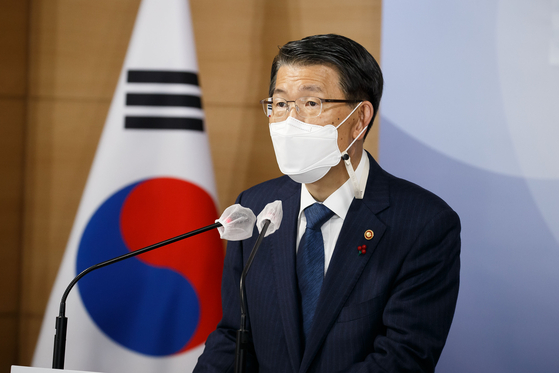Finance Commissioner Eun Seong-soo said, “Please wait until the final decision is made” regarding the resumption of short selling scheduled for March 16 this year. February is the most likely time to decide whether to resume short selling.
Chairman Eun announced the ‘2021 business plan’ on the 18th. said.
Earlier, the Financial Services Commission announced its principled position that’the temporary ban on short selling due to Corona 19 will end on March 15′. However, with the ruling party ahead of the Mayor’s elections in Seoul and Busan in April, there is a continuing claim to extend the ban on the resumption of short selling, and a petition for the abolition of short selling has emerged, centering on individual investors.

Finance Commissioner Eun Seong-soo is explaining the work plan of the Financial Services Commission for 2021 at the joint briefing room of the Seoul Government Complex in Jongno-gu, Seoul on the 18th. Financial Committee
Short selling, “A matter that the financial committee can’t talk about coolly”
Chairman Eun said on the day, “A matter related to short selling is a matter to be decided at a meeting of the Financial Services Commission consisting of nine people,” and said, “Please understand that neither I nor the FSC staff can talk to me on this matter.” The Financial Services Commission consisted of 9 members, including the chairman, vice-chairman, 2 standing members, 1 non-standing member, and 4 ex officio (Vice Minister of Strategy and Finance, Director of Financial Supervisory Service, President of Korea Deposit Insurance Corporation, Vice President of Bank of Korea)
Regarding whether or not to consult with the ruling party on whether to resume short selling, he said, “If the regular National Assembly is held in February, members of the National Assembly can talk, but I think it will be a process of listening, not by the Financial Services Commission,” he said. Democratic Party lawmaker Park Yong-jin emphasized the necessity of consultations, saying, “The Financial Services Commission is too irresponsible to force the resumption of short selling.”
As if conscious of the point that institutions and foreign investors were “a sloped playground,” the Financial Services Commission re-emphasized efforts to improve the short selling system in the work plan data. In order to increase the accessibility of individual investors to short selling, measures such as securing individual stock loans and providing a borrowing window will also be announced in the first half of this year.
In addition, the Financial Services Commission decided to strengthen market monitoring by reducing short selling by market makers to the current half level and shortening the inspection cycle for non-borrowing short selling (6 months → 1 month). Chairman Eun said, “I thought we should make it impossible to even think about illegal short selling.”

Short selling bans in 2020. Graphic = Younghee Kim [email protected]
Maturity extension for small business owners and interest repayment postponement likely to be extended
This year, the Financial Services Commission also decided to pursue a phased normalization of temporary financial support measures, such as extending the maturity of loans and deferring interest repayment. However, the expiration date scheduled for March is likely to be extended. Chairman Eun Seong-soo said, “When we comprehensively consider the current quarantine situation, real economy trends, and financial tolerance, the extension seems inevitable.”
The financial sector agrees with the need to extend the maturity of the loan principal, but expresses difficulty in extending the deferment of interest repayment. This is because companies and small business owners who have not paid even interest are highly likely to become insolvent even after Corona 19 ends.
Chairman Eun said, “The scale of the loan with delayed interest repayment is about 4.4 trillion won, which the financial sector can tolerate.” “I think it is correct to ask small business owners to pay them back because they are in trouble.” After collecting opinions from the financial sector, the Financial Services Commission finalizes whether to re-extend in next month. Even after the repayment postponement measures normalize, a plan for a soft landing was also planned so that the burden of repayment by borrowers would not be concentrated at one time.

Key details of the 2021 business plan announced by the Financial Services Commission on the 19th. Financial Committee
Promoting mandatory large credit loans and amortization of principal
It also decided to strengthen the management of household debt, which is increasing rapidly. With the goal of the next two to three years, the household debt growth rate has been gradually reduced to the 4-5% range. Last year, household debt growth was around 8%.
To this end, plans to advance household debt management will be announced in the first quarter. Convert the total debt principal repayment ratio (DSR) management method for each financial institution to the unit of borrower who lends. A method of substituting DSR from the total debt repayment ratio (DTI) applied to mortgage loans is cited.
Both DTI and DSR are indicators of the ability to repay loans against annual income. However, while DTI sees the repayment ability using the principal and interest payments of the principal and other loans, the standard becomes more strict as DSR is based on the repayment ability of the entire loan. It also includes measures to strengthen the management of large credit loans. As an example, the FSC’s plan is to prohibit payment of a certain amount of credit loans over a certain amount at maturity and to make it mandatory to repay the principal in installments.
However, it was decided to alleviate the side effects of making it difficult for young people to find a home by strengthening loan regulations to prevent real estate speculation and excessive household debt growth. It is reviewing customized tweezers financial support plans, such as expanding exceptions to loan regulations.
Reporter Ahn Hyo-seong [email protected]
